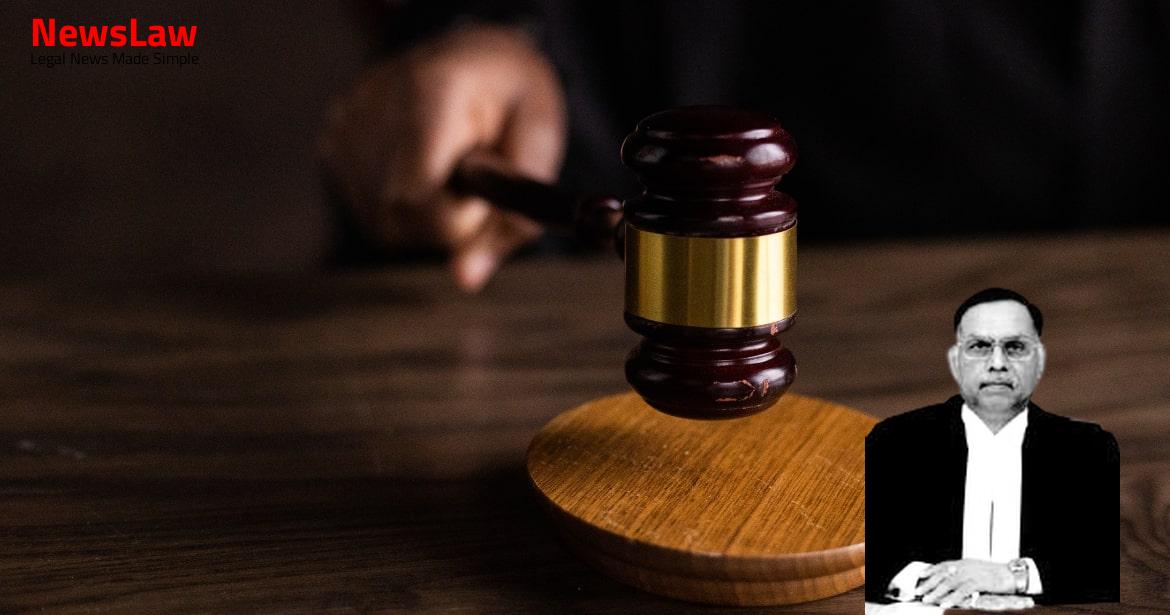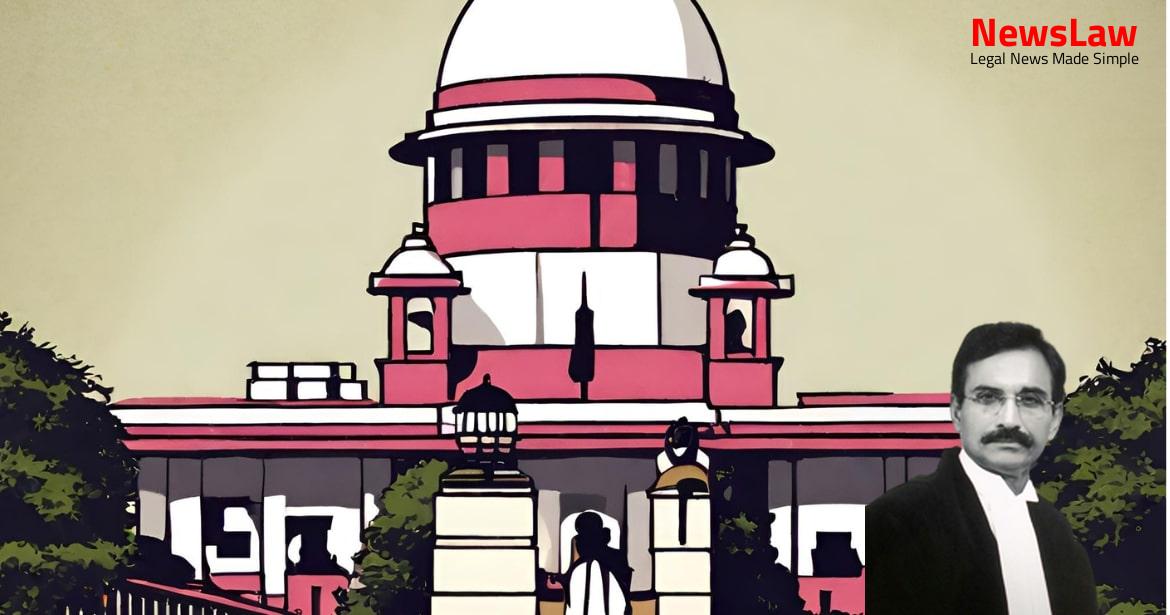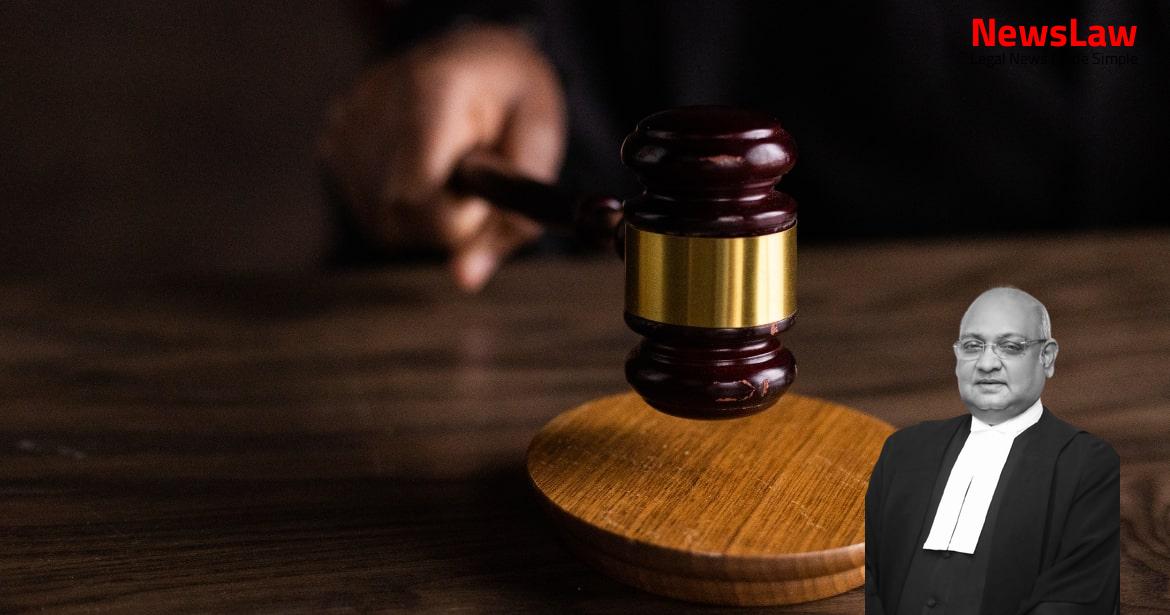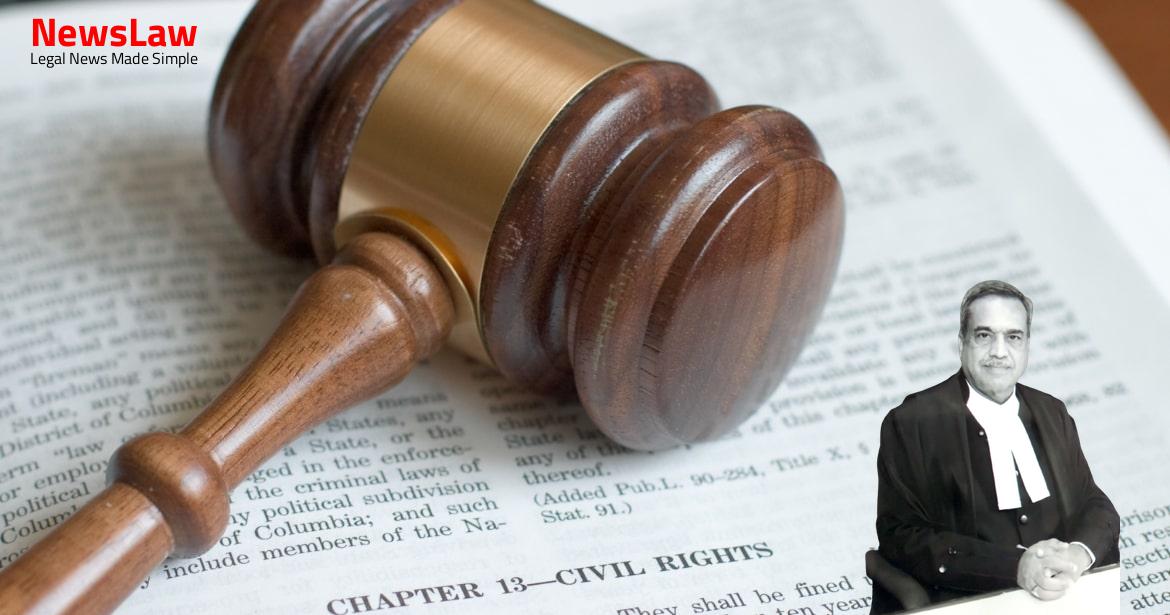Explore a significant legal case that delves into the detailed legal analysis of compliance with the Proviso to Section 17. The court’s interpretation of the legal provisions and the essential procedural requirements laid down provide valuable insights into the application of the law in practice.
Facts
- The tenant filed an application under Order 9 Rule 13 to recall the ex-parte decree dated 31.03.1998.
- The tenant did not deposit the amount due under the decree or file an application seeking direction to give security in lieu of deposit.
- The High Court, Trial Court, and Revisional Court rejected the application under Order 9 Rule 13.
- The tenant had deposited the entire decretal amount under Section 30(2) at the time of filing the application under Order 9 Rule 13.
- The tenant filed an application under Section 5 of the Limitation Act for condoning the delay in recalling the decree.
- The appellant-landlord was aggrieved by the judgments of the High Court dated 13.12.2018 and 24.05.2019 and filed this appeal.
- In the previous applications and proceedings, the tenant’s motives were questioned, and the applications were found to be mala fide.
- Proviso to Section 17 mandates depositing the entire amount due under the decree or giving security for compliance when filing applications to recall ex-parte decrees.
- High Court judgment dated 13.12.2018 remanded the matter back to the trial court
- Trial court allowed the application under Order 9 Rule 13 CPC and Section 5 of the Limitation Act on 24.05.2019
- District Judge rejected the revision against the trial court order dated 19.04.2007 on 23.02.2008
- Writ Petition No.418 of 2008 filed by the tenant in High Court
- High Court allowed the Writ Petition, setting aside previous orders and remanding the matter for reconsideration
Also Read: Analysis of Seniority Determination in Armed Forces Personnel Case
Issue
- Issue 1: Compliance with Proviso to Section 17 of the Provincial Small Cause Courts Act, 1887 in the application filed by the respondent-tenant under Order 9 Rule 13, CPC on 25.08.1998 needs to be examined.
- Issue 2: Verification of whether the respondent-tenant deposited the entire amount due on 25.08.1998 under Section 30(2) of U.P. Act No.13 of 1972.
- Issue 3: Determining if the deposit of rent under Section 30(2) of the U.P. Act No.13 of 1972 can be considered as deposited under the proviso to Section 17 of Act, 1887.
- Issue 4: Assessment of whether the respondent-tenant has provided sufficient grounds to allow the application filed under Order 9 Rule 13 CPC dated 25.08.1998.
Also Read: Interstate Prisoner Transfer: Court’s Legal Analysis
Arguments
- The deposit made under Section 30(2) of the U.P. Act No.13 of 1972 was in the name of the appellant as well as the respondent No.5, hence, the deposit was not relevant for giving benefit to the tenant under Section 17 proviso.
- The respondent’s argument is that the amount deposited under Section 30(2) of U.P. Act No.13 of 1972 should be credited for the proviso to Section 17 of the Act, 1887.
- The appellant maintains that the tenant’s application under Order 9 Rule 13 was rightly rejected due to non-compliance with the mandatory provisions of Section 17 Proviso of the Act, 1887.
- The tenant failed to deposit the entire decretal amount due on the date of filing the application under Order 9 Rule 13, which was a requirement under the proviso to Section 17.
- The application to benefit from the amount deposited under Section 30(2) of UP Act No.13 of 1972 was filed by the tenant four years after the fact, which according to the appellant, should not have been considered beneficial to the tenant.
- Overall, it is argued that the deposits made under Section 30(2) did not cover the total amount due at the time of filing the application under Order 9 Rule 13.
Also Read: Judicial Analysis on Conversation Authenticity and Enquiry Need
Analysis
- The application under Order 9 Rule 13 can only be allowed when sufficient cause is made out to set aside the ex-parte decree.
- It is essential for the applicant to have already made an application seeking permission to provide security as per the court’s satisfaction.
- In cases where exemption from the applicability of Act No.13 of 1972 is claimed, Section 30 of the Act will not be applicable.
- Deposits made under Sub-Section (4) of Section 20 and under Section 30 of U.P. Act No 13 of 1972 are in the custody of the Court and can be withdrawn by the landlord when needed.
- A clear grasp of the foundational facts is crucial in such cases.
- The applicant did not move any application to dispense with the deposit and seek leave of the court for providing security as directed by the court.
- The delay on the court’s part in passing an appropriate order should not be held against the applicant.
- The High Court concluded that the entire amount due from the tenant had already been deposited, making the application to recall the ex-parte decree incompetent.
- The deposit under Section 30(2) was made at the tenant’s own risk, and the parties were free to question its validity in the pending suit.
- The trial court rightly rejected the application under Order 9 Rule 13 due to non-compliance with the proviso of Section 17.
- The application was not filed in accordance with the proviso of Section 17, hence deemed incompetent.
- The High Court’s interference with the trial court’s order was not justified as the application did not meet the necessary requirements.
- Compliance with the proviso of Section 17 is mandatory for the application under Order 9 Rule 13.
- The tenant failed to make the necessary deposit and seek permission to provide security, leading to the rejection of the application.
- The Act No.13 of 1972 was not applicable in the building, making deposits under Section 30 irrelevant for the case.
- The court observed that even with compliance of Section 17 proviso, the application under Order 9 Rule 13 cannot be automatically granted.
- The plaintiff’s claim of exemption from the Act No.13 of 1972 was crucial for the case.
- The trial court was correct in rejecting the application, and the District Judge’s interference was unwarranted.
- The High Court should have set aside the order of the District Court as the application filed by the respondents was deemed incompetent.
- Section 30(4) allows for the withdrawal of deposits made under Section 30 upon application.
- Section 30(6) states that deposits made are considered as payments to the landlord or beneficiary on the date of deposit.
- The language of the proviso in Section 30 appears to be mandatory and not directory.
- Section 20(6) specifies that amounts deposited by tenants must be promptly paid to the landlord upon application, regardless of the ongoing legal proceedings.
- In the case of Prem Chandra Mishra, a certain amount was deposited by the tenant on the first date of hearing.
- Some amount was also deposited under Order 15 Rule 5 CPC by the tenant.
- The amount deposited under Section 20(4) of the Act No.13 of 1972 and Order 15 Rule 5 CPC could have been deemed to have been paid on the date of such deposit.
- Reference to the judgment in Kailash versus Nanku and others, where the Court emphasized that all rules of procedure are essential for the administration of justice.
- The High Court’s observations regarding the trial court’s rejection of the tenant’s application under Order 9 Rule 13 were not approved.
- The trial court rejected the tenant’s application not based on hyper-technical or pedantic reasons but due to non-compliance with the proviso to Section 17 of the Act, 1887.
- The requirement under the proviso to Section 17 was a legal necessity and a condition precedent for the maintainability of the application under Order 9 Rule 13.
- The High Court’s view that the trial court and Revisional Court took a hyper-technical and pedantic approach was deemed incorrect.
- The lower courts were deemed to have applied a hyper-technical and pedantic approach in considering the applications under Order 9 Rule 13 of CPC and Section 5 of the Limitation Act.
- As a result of the hyper-technical and pedantic approach adopted by the lower courts, the impugned orders were considered liable to be quashed.
Decision
- Court passed an order to proceed ex-parte on 24.02.1997.
- SCC Case No.4 of 1994 filed in the Court of Additional Civil Judge, Senior Division, Roorkee.
- Order of the trial court dated 19.04.2007 rejecting respondent’s application under Order 9 Rule 13 upheld.
- Judgment dated 13.12.2018 and order dated 24.05.2019 rejecting review application and consequential order set aside.
- Executing Court directed to execute the decree in favor of the appellant within three months.
- Appellant referred to as ‘landlord’ and respondent No.1 as ‘tenant’.
- Appeals allowed with costs of Rs.25,000.
- High Court judgment dated 13.12.2018 not sustained.
- Respondent was inducted as tenant at Rs.150 per month by predecessor-in-title of the landlord.
Case Title: SUBODH KUMAR Vs. SHAMIM AHMED (2021 INSC 146)
Case Number: C.A. No.-000802-000803 / 2021



